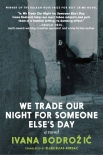We Trade Our Night for Someone Else's Day, Ivana Bodrozic [adventure books to read txt] 📗

- Author: Ivana Bodrozic
Book online «We Trade Our Night for Someone Else's Day, Ivana Bodrozic [adventure books to read txt] 📗». Author Ivana Bodrozic
“And now we’ll sketch our poet’s context to help you get to know him better.” The elderly moderator in her creaky voice introduced her remarks on the poet’s life.
“Our Grozdan was born not far from here in the month of March—a time of year that heralds springtime and life, but that very same month the Danube River flooded the city. At the time, nobody saw this as a symbol of a coming flood, nor would anybody have believed that twenty-six years hence, the city would become a new Atlantis. But perhaps this is the very moment where we should seek the genesis of his creative opus, the reason why Grozdan would become a poet whose verses would capture the apocalyptic accent of our world and the spirit of rebellion. Borne by the powerful force of precognition, he unmistakably forecasts the cataclysm and the integral deconstruction of the world. He draws through aesthetic exorcism the times we have fallen victim to and their image. Meanwhile he practices the meditational techniques of Vipassana, Kundalini, Nada Brahma, and Nataraj, and has shown a growing interest in the cultures of the East,” enumerated the moderator, while Nora—standing the farthest from the improvised stage at an elevated vantage point within the room, the only person standing by the door—focused on the nonverbal processes going on within the reading room. The older members of the audience, in the first rows, were struggling to stay awake and swearing to themselves that as soon as they made it home tonight they wouldn’t stop to brush their teeth, or what was left of them, but would hop straight into bed. Several of the middle-aged ladies soaked up every word, their eyes wide, nodding like mechanical toys. It would take them weeks to recover from the marvels of the evening. Through the sliver of a gap between the audience members and the chairs, Nora could see Velimirović’s fingers on the edge of the seat of Nikola’s chair, drumming to the rhythm of the creaky voice, and the poet’s impassive gaze, soaking up, chameleonlike, the romanticized paeans of praise with the entire surface of his body. She noticed one of the feet of the young man who’d be reading the verses twitch uncontrollably under the embroidered tablecloth. His voice cracked as he fought to recite “Poem to My Native City” in a loud voice, almost shouting: “They extracted you from my body as if you were my gall bladder”—bellicose, tearful, overdone.
Just then, Velimirović stood up and, hunched over with his cell phone to his ear, strode by Nora without noticing her turn to follow him, shadowlike, while rummaging through her purse for cigarettes. Velimirović moved into the depths of the courtyard while she remained hidden in the shadows under an overarching balcony. A beam of light from a spotlight on the façade of the building lit his broad shoulders, framed by the darkness and black branches. He shifted from foot to foot, and the conversation so engrossed him that he briefly perched, several times, on one foot. He spoke in a soft mumble, widening the circle of his pace through the courtyard, coming at one point right to a slender birch tree not far from Nora, who was keeping her eyes trained on him. He ran his fingers over the birch bark, tenderly smoothing the loose white ribbons, as if nursing the tree back to health, like he was in his own backyard, somewhere where the very bark of the trees and their seasonal changes were familiar to him. Nora wasn’t in the mood to go back in. She was sickened by this whole circus of the unnamed apocalypse which had, floodlike, inundated the city, these people out to retailor history, to translate their bystander role into one of victimhood—and, leading the charge, the narcissistic poet flogging his story to the world. This travesty inspired in her first sarcasm, then fury, and then grief. Of Velimirović she knew what everyone knew; more or less everything he’d done was public knowledge, yet somehow this wasn’t enough to damage his reputation. He’d trained as a psychiatrist and earned his medical degree in Belgrade; his professional, wartime, and political career, in Croatia, reached its peak in the autumn of 1991, when he marched into the devastated city as the officer in charge of the Medical Corps for Western Srem. He and Goran Hadžić were, in fact, the first to venture into the ruins of the hospital. As a high-ranking official, Hadžić served as a minister in the Serbian Krajina government, and at the signing of the Erdut Agreement Velimirović represented a new Serbian party formed during the transitional administration by fusing together several existing parties, to distance him from his previous party, which was illegal and notorious. This was the way Velimirović came to be a political leader. He was decorated at the infamous Bosnian Serbian headquarters at Pale by Radovan Karadžić with the Order for Wartime Services in the Danube River Valley, and only a few years later, he received another medal for his contribution to the peaceful reintegration of





Comments (0)